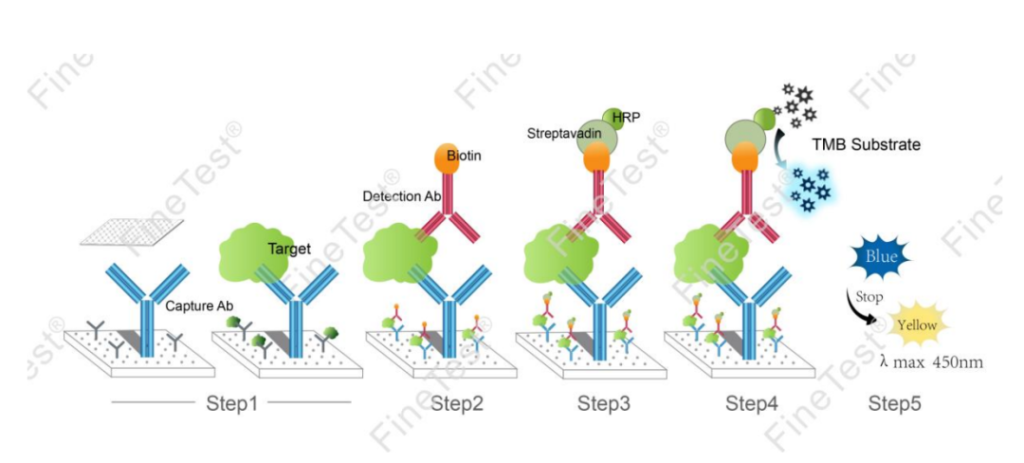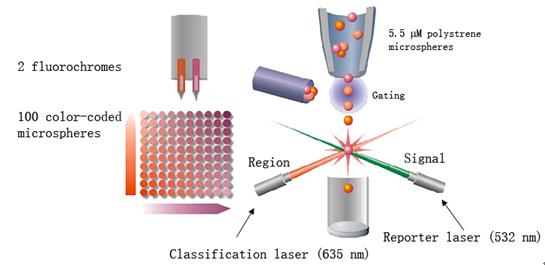Abstract: Cytokines have wide biological functions, and can regulate various physiological processes, e.g. innate and adaptive immune response, blood cell generation, cell growth, pluripotent embryonal stem cell and tissue damage repairing. Various types can be divided based on the function and effect, including interleukin(IL), interferon(IFN), tumor necrosis factor(TNF), colony-stimulating factor(CSF), chemokine and growth factor(GF) etc. Accurate measurement of cytokine detection is very important for treatment and diagnosis of the diseases. Furthermore, the development of quantitative detection provides the prospect to clinical application.
Keywords: Cytokine Detection, Cytokines and Their Functions, ELISA, Flow Cytometry, Multiplex Immunoassay
1. Cytokines and Their Functions
Cytokines play their roles via several ways, including autocrine, paracrine and endocrine. In autocrine, cytokines act on autoreceptor to regulate the cell function. In paracrine, cytokines act on adjacent cells and are involved in local immune response, inflammatory response and tissue repairing. In endocrine, cytokines are transmitted via blood or body fluid, and regulate systemic immune response and physiological process via acting on long-distance target cell. Besides, cytokines play a key role in immune system activation, cell proliferation and differentiation, apoptosis regulation. Thus, the immune function of the body and normal growth and repair of tissues are maintained.
2. Common Cytokine Detection Methods
Currently, types of cytokine detection methods are various and include single target detection, multiple targets detection and single cell-level detection etc.
2.1. ELISA for Cytokine Detection
ELISA is the qualitative and quantitative detection method via fixing soluble antigen or antibody on solid carriers like polystyrene. Using antigen-antibody specific binding conducts immune reaction.
The features include high stability, high detection rate, large molecular weight, easy operation, celerity, high sensitivity, low requirements for experimental devices etc. ELISA is widely applied in various detections and free of radioactive contamination. ELISA can also conduct qualitative analysis and quantitative analysis for semimicrodetermination, microdetermination, ultramicrodetermination. It's one of the fastest growing and widely applied enzyme immunoassay techniques.

2.2. Multiplex Immunoassay
Multiplexed microsphere-based flow cytometric assay(MFCA) and luminex multiplex cytokine assay(LMCA) are based on fluorescently labeled microspheres technology. MFCA quantitatively detects multiple cytokines and fluorescence signal via different colors of fluorescently labeled microspheres, coated specific capture antibody and flow cytometry. LMCA can detect a maximum of 100 cytokines in the sample via different fluorescent microspheres and fluorescently labeled secondary antibodies. Advantages of the two technologies are high throughput, multiple cytokines detection, large-scale sample analysis. However, they also have disadvantages like expensive equipment, complex data analysis and many operation steps etc.

2.3. Quantitative Real-time polymerase chain reaction(qPCR)
qPCR is a technology combined with polymerase chain reaction(PCR) and fluorescence probe. It's applied in quantitative analysis of DNA or RNA. During PCR amplification, qPCR monitors changes of fluorescence signal in real time, and accurately measures the number of target gene. This technology is featured with high sensitivity, high specificity and high precision. It's suitable for gene expression analysis, gene mutation detection and pathogen quantification. Although the operation is easy, professional devices and data analysis software are still required to ensure accurate results.
3. Conclusions
Different cytokine detection technologies have their own advantages and limitations. Selected method depends on experimental requirements, e.g. sensitivity, throughput and costs etc. ELISA is applied in quantitative analysis of single cell. Luminex and MFCA are suitable for high throughput detection of multiple cytokines. PCR(qPCR) is used for quantitative research of gene expression.
4. Recommended Products
|
Cat.No |
Product Name |
Range |
Sensitivity |
Citations |
|
Human IL-1β ELISA Kit |
3.906-250pg/ml |
2.344pg/ml |
52 |
|
|
Human IL-6 ELISA Kit |
4.688-300pg/ml |
2.813pg/ml |
99 |
|
|
Human IL-8 ELISA Kit |
7.813-500pg/ml |
4.688pg/ml |
24 |
|
|
Human IL-10 ELISA Kit |
7.813-500pg/ml |
4.688pg/ml |
43 |
|
|
Human IL-17A ELISA Kit |
31.25-2000pg/ml |
18.75pg/ml |
24 |
|
|
Human IL-18 ELISA Kit |
15.625-1000pg/ml |
9.375pg/ml |
9 |
|
|
Human IFN-β ELISA Kit |
62.5-4000pg/ml |
37.5pg/ml |
4 |
|
|
Human IFN-γ ELISA Kit |
15.625-1000pg/ml |
9.375pg/ml |
27 |
|
|
Human MCP-1 ELISA Kit |
15.625-1000pg/ml |
9.375pg/ml |
11 |
|
|
Human TNF-α ELISA Kit |
15.625-1000pg/ml |
9.375pg/ml |
86 |
|
|
Human TGF-β1 ELISA Kit |
31.25-2000pg/ml |
18.75pg/ml |
42 |
|
|
Human VEGF ELISA Kit |
31.25-2000pg/ml |
18.75pg/ml |
31 |
|
|
Mouse CXCL15 ELISA Kit |
15.625-1000pg/ml |
9.375pg/ml |
11 |
|
|
Mouse IL-1β ELISA Kit |
3.906-250pg/ml |
7.5pg/ml |
58 |
|
|
Mouse IL-4 ELISA Kit |
15.625-1000pg/ml |
9.375pg/ml |
12 |
|
|
Mouse IL-6 ELISA Kit |
15.625-1000pg/ml |
9.375pg/ml |
69 |
|
|
Mouse IL-10 ELISA Kit |
15.625-1000pg/ml |
9.375pg/ml |
38 |
|
|
Mouse IFN-α ELISA Kit |
15.625-1000pg/ml |
9.375pg/ml |
1 |
|
|
Mouse IFN-β ELISA Kit |
15.625-1000pg/ml |
9.375pg/ml |
7 |
|
|
Mouse IFN-γ ELISA Kit |
31.25-2000pg/ml |
18.75pg/ml |
14 |
|
|
Mouse TGF-β1 ELISA Kit |
31.25-2000pg/ml |
18.75pg/ml |
16 |
|
|
Mouse TNF-α ELISA Kit |
3.906-250pg/ml |
2.344pg/ml |
91 |
|
|
Mouse VEGF ELISA Kit |
15.625-1000pg/ml |
9.375pg/ml |
4 |
|
|
Rat IL-1β ELISA Kit |
3.906-250pg/ml |
18.75pg/ml |
73 |
|
|
Rat IL-6 ELISA Kit |
62.5-4000pg/ml |
37.5pg/ml |
109 |
|
|
Rat IL-10 ELISA Kit |
31.25-2000pg/ml |
18.75pg/ml |
24 |
|
|
Rat IL-18 ELISA Kit |
31.25-2000pg/ml |
18.75pg/ml |
24 |
|
|
Rat TGF-β1 ELISA Kit |
31.25-2000pg/ml |
18.75pg/ml |
29 |
|
|
Rat TNF-α ELISA Kit |
3.906-250pg/ml |
2.344pg/ml |
134 |
REFERENCES
[1]Optical Nanosensor Passivation Enables Highly Sensitive Detection of the Inflammatory Cytokine Interleukin-6, PMID: 38745465.
[2]Detection of cytokines in nasal lavage samples of patients with cystic fibrosis: comparison of two different cytokine detection assays, PMID: 38890643.
